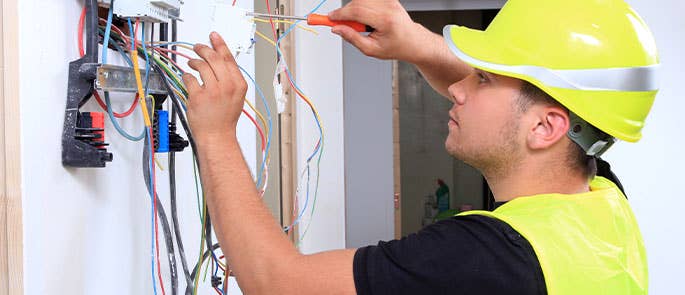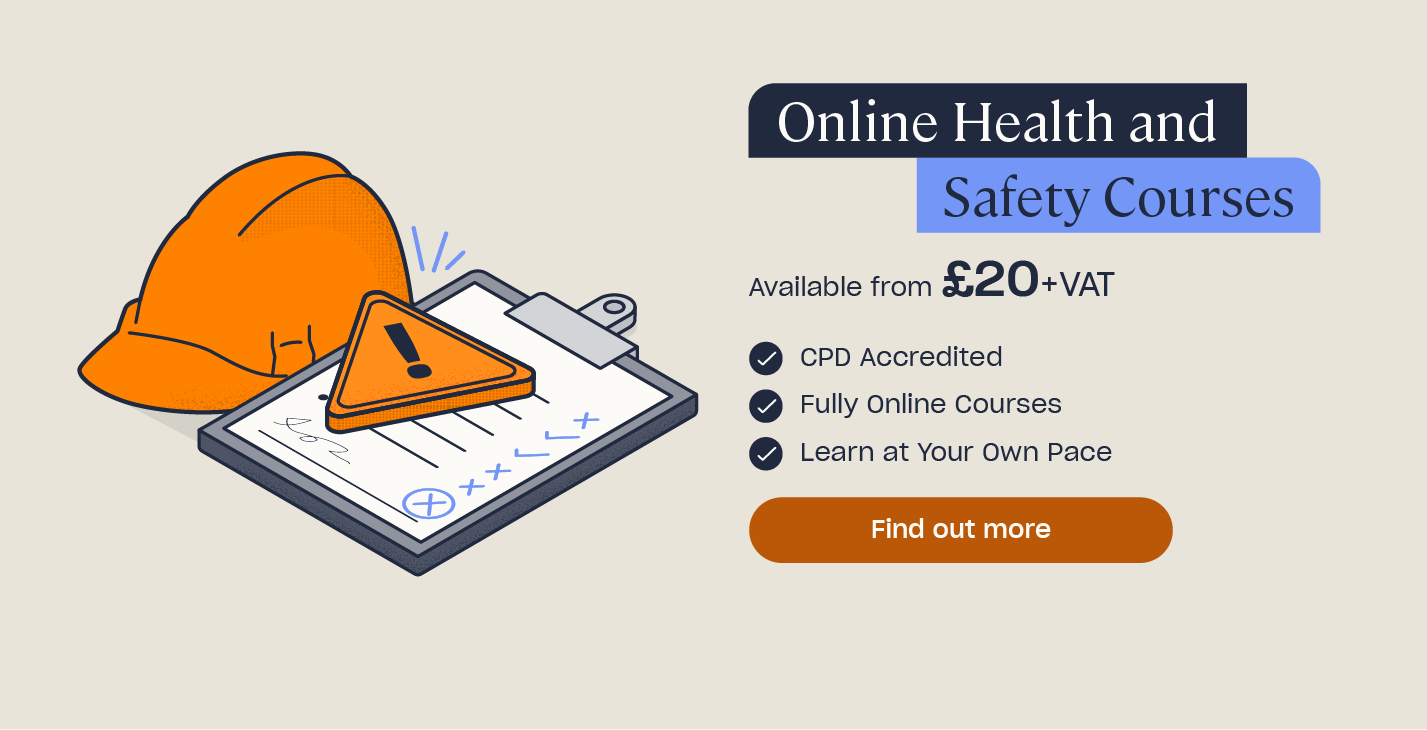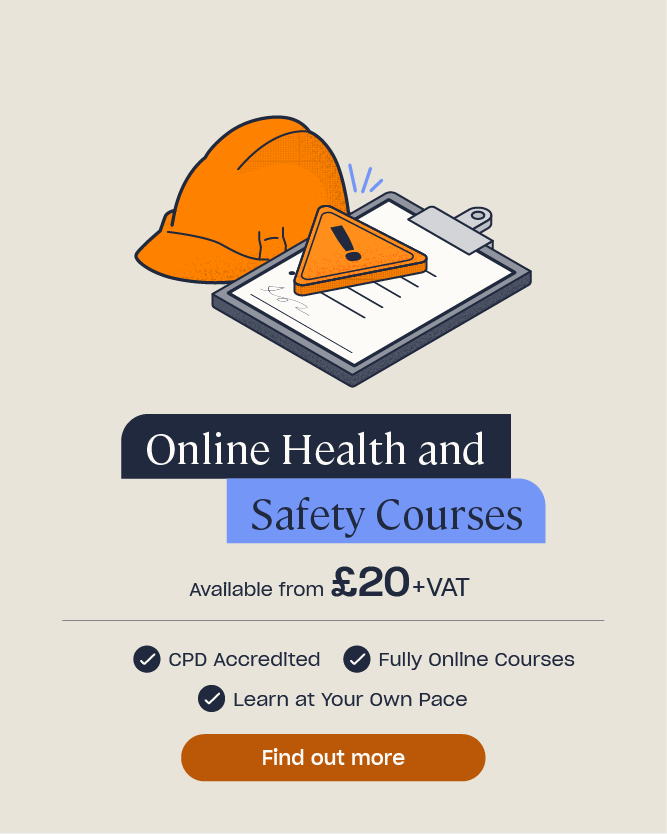Interview Questions for an Electrician
Electricians are skilled tradespeople who perform a wide range of tasks. A career as an electrician can offer job security, exceptional earnings and the opportunity to engage in interesting and varied work in countless different locations. Electricians are in constant demand making it a stable career even during times of economic turmoil.
Whether you are just getting started in your career as an electrician or you’re looking for something new within the industry, interview preparation is essential to making the best impression possible. In this article we will explore common interview questions for electricians and provide guidance on how you can go about answering them. We will also touch on questions you should consider asking during an interview and the best attire for an interview.

Electrician Interview Questions
There are many different fields that an electrician can work in and many different specialisms that you can have. As it is such a diverse industry, the specific path that you decide to go down will greatly impact that type of questions that you may be asked. For example, a prospective employee for a position as a domestic electrician will be asked slightly different questions to someone applying for a commercial electrician position. Nevertheless, there are certain interview questions that are likely to be asked irrespective of the field.
Below you will find 10 questions that you may be asked during an interview for a role as an electrician. The ‘answers’ to these questions highlight key points that you should try to mention as well as some insight into why you may be asked them. The questions seek to assess your hard skills, soft skills, transferable skills, technical skills, safety knowledge and problem solving abilities. They also include examples of behavioural and situational questions that an interviewer may ask to gain an understanding of how you might act in different situations.
The answers below should be used as a general guide and not memorised to be repeated verbatim. Moreover, you should take the time to research the company you are applying to so that you have an understanding of how they work and so that you can add relevant company specific information to your answers. For example, you may be asked about your background and what projects you have worked on in the past. If the company that you are applying to has worked on similar projects you can allude to this and use it to affirm that you would be a valuable addition to the team.
Tell us about yourself 
Whilst this isn’t technically a question, it’s highly likely that you will be asked to talk about yourself at some point during the interview. This question is intended to get to know you personally, but that doesn’t mean you should spend 10 minutes talking about your favourite film. Ensure that your answers are concise and relevant to the role that you are applying for. Discuss personality traits that will make you a valuable employee such as having a keen eye for detail or having a growth mindset.
A beneficial way to approach this question is to talk about your current position/role and how you got there. If you are interviewing for your first position in the industry then discuss your relevant work experience and qualifications and how what you have learned has readied you to start your career.
Why do you want to be an electrician? 
This question is bound to come up in one way or another so it’s imperative that you have a succinct answer ready. This is your chance to show your enthusiasm and investment in a career as an electrician. If you are applying for a specific specialism this is also the perfect opportunity to highlight any pre-existing knowledge in that area. Be sure to mention what you hope to achieve in your career as an electrician and how your previous experience/study has fuelled your desire to work as an electrician.
If you have prior experience in the industry then you should highlight what you already enjoy about working in the sector and what future lessons you are hoping to learn. If you are applying for your first role in the industry, highlight what you have learnt during work experience and/or your studies and how that has positively influenced your career direction.
What important safety rules should all electricians follow? 
Electricians in the UK must adhere to strict safety regulations to keep colleagues and customers safe. This question assesses your knowledge of electrical safety regulations and it’s imperative that you are aware of the expected safety procedures. You don’t necessarily need to know the specific name of each act and regulation, but you should mention the safety parameters that all electricians should be aware of. To expand your answer you could include an example of a time when safety rules not being followed caused injury, or where the application of safety rules prevented harm. You could also include examples of specific safety procedures such as lock out/tag out, to reaffirm your understanding of the importance of maintaining safety and highlight your experience in the real world application of safety practices.
What kinds of systems have you previously worked with? 
This question seeks to assess the scope of your experience with using key electrical systems. If you have prior experience in the industry then you can tailor your answer to match your CV and give specific examples of how and when different systems were used in previous roles. You can also relate this back to the research you have done on the company by mentioning specific systems that you know they use and that you have experience using.
If you are applying for your first role in the sector you may not have hands-on experience with many electrical systems but you should have an understanding of how they work. This is still useful information and can highlight your willingness to learn. If you have taken the time to learn about different systems outside of the scope of your studies or apprenticeship, be sure to mention that too as it highlights your enthusiasm and ambition.
What would you do if a colleague experienced a severe electrical shock? 
This is another question that seeks to assess your knowledge of safety procedures. Whilst all electricians should do everything within their power to reduce the risk of an electrical shock, given the nature of the industry it is highly likely that an electrical shock will occur at some point. As such, it’s imperative that you know what to do in this situation.
If a colleague experiences a severe electrical shock you should:
- Separate them from the source of electricity as soon as possible, either by unplugging the appliance or turning off the mains. If this isn’t possible then remove them from the source of electricity but do not touch them as you may suffer a shock as well. Use an insulating piece of material such as a piece of wood to gently move them away.
- After removing them from the source of electricity, open their airway by placing one hand on their forehead and gently tilting the head back, then lift the chin with two fingertips.
- Look and listen for normal breathing for approximately 10 seconds. If the casualty is breathing normally, place them in the recovery position, get help and continue to monitor their breathing.
- If the casualty is not breathing, get help, call for an ambulance and if available an automated external defibrillator (AED) and start chest compressions (CPR).
- Follow the instructions provided by the AED. Then start chest compressions, leaning over the casualty and pressing down on the centre of the breastbone, 5-6cm deep.
- Repeat the process at a rate of about 100 – 120 times a minute and after 30 compressions open the airway again, pinch the casualty’s nose and blow steadily into their mouth while watching to see if the chest rises.
- Repeat and blow steadily once more and then continue with chest compressions.
- Continue CPR until qualified help takes over or the casualty starts breathing normally.
How would you go about troubleshooting a circuit breaker? 
This question is testing both your hard skills and problem solving abilities. A prospective employer will want to see how you would go about tackling this issue, what your methodology would be and if your response is accurate. Talk them through the process and where applicable explain your rationale. Whilst it’s logical to assume that the interviewer will know the answer to the question and understand each step, don’t be afraid to expand your answer where appropriate and provide useful contextual knowledge. For example, if you mention that you would look for burn marks, explain that you would do so as that would indicate heat damage which may require a different approach.
Give me an example of a time when…? 
Questions such as this are a great way to demonstrate your knowledge and experience. The question may be more technical and focus on a time that you used a specific system or tool, or it may relate to soft skills by asking for an example of a time when you demonstrated leadership. Regardless of the focus, it’s useful to answer these questions using the STAR method.
STAR stands for situation, task, action, result and it provides a structure which allows you to effectively demonstrate your experience. This method enables you to highlight key skills and beneficial qualities to prospective employers whilst providing a clear and concise answer. When using the STAR method be sure to place emphasis on the action and result as this showcases your effectiveness at solving problems and finding solutions.
Questions such as this can cover a wide range of topics. For example, you may be asked about a time in which a colleague didn’t follow proper safety procedures such as by having inadequate PPE and what you did to rectify that. Carefully consider what you are being asked and what attribute the interviewer is trying to see evidence of by asking that specific question.
Can you describe a time where you had to work as part of a team? 
As any tradesperson will tell you, teamwork is vital to a productive and efficient working environment. As such, prospective employers will want to know how well you work with others. It’s not enough to simply mention that you have worked in a team in the past, they want to know what you gained from it, what challenges you faced and how you overcame those challenges by working together. This is a great opportunity to highlight your strong communication and active listening skills by affirming their importance to effective team collaboration.
What is the largest project you’ve ever worked on? 
This is a good opportunity to discuss your experience and link it with your CV. Whilst it’s not a guarantee that you will be asked this question, there will undoubtedly be a moment to mention past projects you have worked on so it’s advantageous to have an answer prepared, or at the very least a project in mind. Discuss the scope of the project, challenges that you faced and how you overcame them. This is also a great opportunity to reaffirm what you have previously said in the interview. If this project included the use of systems that you know the company that you are applying to uses, be sure to mention how you used them. If you worked on the project as a part of a team, mention how that benefited the overall success of the project. Using the STAR method to answer this question can help you to keep your answer concise and relevant, especially when mentioning any difficulties that you overcame whilst working on the project.
Have you ever made a mistake on a job? How did you correct it and what did you learn from it? 
This isn’t a trick question and whilst it might seem counterintuitive to ask a prospective employee about mistakes that they have made, questions such as this are trying to assess your ability to learn from your mistakes. Be honest in your answer but try to choose a mistake that you successfully corrected without causing significant delays or costs (you are trying to make a good impression after all!). Everyone makes mistakes and it would be somewhat unbelievable if you answered this question with no. However, you can tailor your answer so that it is both honest and showcases your growth mindset. Clearly explain what the error was and the consequences of the mistake. If you noticed the mistake before it caused an issue and corrected it immediately, be sure to mention that as it highlights a keen eye for detail. Once you’ve explained what the mistake was, move on and focus on what you did to correct it and what you learnt from that process. It’s important to be honest but don’t dwell on the mistake that you made, the focus here should be on corrective actions you took and your ability to turn a negative into a positive.
Want to Learn More?
Ensuring that all safety protocols are followed is integral to keeping electricians safe. Our Electrical Safety Training course will teach you the main risks and necessary controls for the safe use of electricity at work.
Interview Questions for an Apprentice Electrician
Apprenticeships are a great way to earn as you learn and gain invaluable hands-on experience. There is ample demand for skilled electricians and by extension apprenticeships can be competitive. As such, it’s important that you go into an apprenticeship interview well prepared and with a good idea of what will be asked of you. Below you will find questions that you may be asked during an apprenticeship interview. The questions that you will be asked when applying for an apprenticeship are likely to focus on your enthusiasm for a career in the industry, your eagerness to learn and what foundational knowledge you already have.
Interviews of any kind can be daunting and if you are interviewing for an apprenticeship it may well be your first formal interview. Therefore it’s vital that you take the time to prepare for your first interview by considering what questions you may be asked and what information you should include in your answers. This will help to reduce any anxiety that you may have and ensure that nerves don’t get the better of you during the interview.
Why did you apply for this apprenticeship? 
As you are applying for an apprenticeship your interviewer is going to want to learn about your potential. They are going to want to see enthusiasm for personal development and that you have done your research about that specific apprenticeship. Mention what you know about apprenticeships, the benefits of hands-on experience and try to include something unique to that specific one. For example, if the apprenticeship to which you are applying specialises in your field of interest, mention that interest and your enthusiasm to learn more about that specialism as part of your motivation for applying.
Where do you see yourself in 5 years time? 
Apprenticeships give you the opportunity to hit the ground running once you have qualified and it’s not uncommon to continue working at the same establishment you completed your apprenticeship. Your interviewer is going to want to see how you will hit the ground running and the extent of your ambition. If there isn’t a specific role that you see yourself in in 5 years time, don’t simply answer ‘I don’t know.’ Instead, broaden out the question and focus on the environment you would like to be in. For example you may answer ‘in 5 years time I would like to be a qualified domestic electrician with managerial responsibilities and in an environment that challenges me.’ An answer such as this doesn’t necessarily lock you into a set path but it shows a clear sense of ambition and direction.
If you know in advance that your apprenticeship could lead to a job offer, then you should mention a future with said company. Apprenticeships are a two-way investment and a business will want to see that they can rely on you and get a good return on their investment.
What technology do you have experience working with? 
When answering this question be sure to mention all technology that you have worked with and where possible the environment in which you used them. If you have limited hands-on experience then discuss the technology that you have a theoretical knowledge of and that you are eager to learn more about with hands-on experience. It’s imperative that you do thorough research on where you are applying before the interview. This research can reveal specific technology that is used and if you have experience with that technology you should be sure to mention it. Comparatively, if you know that the place to which you are applying uses a type of technology that you have no experience using, draw parallels with tech you have used and how that knowledge would help you to quickly learn how to use new systems. As apprenticeships are entry-level positions, it’s not necessarily expected that you will have extensive experience using different technologies. However, having an awareness of common tech used in the industry and learning how they work and how to use them, will undoubtedly be advantageous.
Talk to me about your studying and learning method. 
Apprenticeships are learning opportunities and you will be expected to study alongside your vocational learning. A prospective employer will want to see how you go about acquiring more skills and knowledge and how well you will be able to absorb and apply that knowledge. Simultaneous study is a core part of an apprenticeship and you need to demonstrate that you would be able to handle both study and work without compromising the quality of either.

Questions to Ask in an Electrician Interview
Interviews are a two-way street and just as much an opportunity for you to learn about the company as it is for them to learn about you. Asking questions at the end of an interview enables you to gain a deeper insight of the business and people you may be working with. Try to have a few questions prepared in advance but ensure that they haven’t already been answered organically before you ask. If you ask a question that was clearly explained 10 minutes prior, it doesn’t speak well to your listening ability.
When preparing questions try to have a mix of company specific, role specific and concluding questions, but don’t bombard the interviewer. It’s also important to have an element of flexibility when it comes to your questions. You may prepare a list of 10 questions but by the end of the interview realise that only 3 are pertinent. Conversely, you may find that a comment from the interviewer sparks a question that you hadn’t thought of before. If you are too rigid in your approach to your questions you may miss the chance to ask an organic question or focus too much on getting through your list, rather than assessing whether you actually need to ask that specific question.
Below you will find some useful questions to ask a prospective employer at the end of an interview:
- Is there anything from my CV or that I have said that you would like me to clarify in further detail?
- What are the qualities of a successful employee in this business?
- What opportunities are available to gain further qualifications/certifications within the business?
- Can you tell me about a recent success that the business achieved and how this has guided your direction for the future?
- Upon completion of my apprenticeship what internal employment opportunities would be available?
What Should you Wear to an Electrician Interview?
When considering what to wear to an interview the safe choice is often smart, business attire. However, electricians work in a variety of environments and are unlikely to spend the majority of their time in three piece suits. Whilst your attire at an interview is important as it shows your professionalism and helps to cement a good first impression, it should be reflective of the role and industry that you are interviewing for.
With this in mind, the best attire for an electrician interview is smart/business casual. Avoid wearing jeans if possible and instead wear plain dark trousers or a skirt, with a plain long-sleeved shirt. Depending on the role that you are applying for you may decide to wear a tie, however, if your position is likely to be more site based then you don’t need to wear one. Keep your footwear simple and closed toe, avoiding trainers or excessively high heels.
If you are unsure or have been invited to a more informal interview, remember you can always ask. You may worry that this could come across negatively to a prospective employer but it is better to be safe than sorry and asking shows your eagerness to meet their expectations and avoid ambiguity, both of which are valuable traits for a prospective employee to have.

Interviews can be daunting but with thorough preparation you can ensure that you are in the best position to make a good first impression. Whilst nerves are to be expected, preparing in advance by running through potential questions and researching the company to which you are applying, will help you to feel more relaxed and confident during the interview.
Further Resources:
- Health and Safety Courses
- How to Become an Electrician
- Interview Questions for Construction Workers
- How to Stand Out in a Virtual Interview: Preparation Tips
- Writing A Professional Development Plan – Example & Template
- How to Conduct a Successful Video Interview







